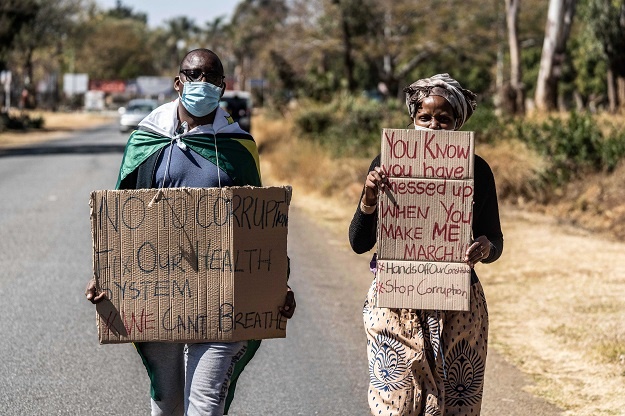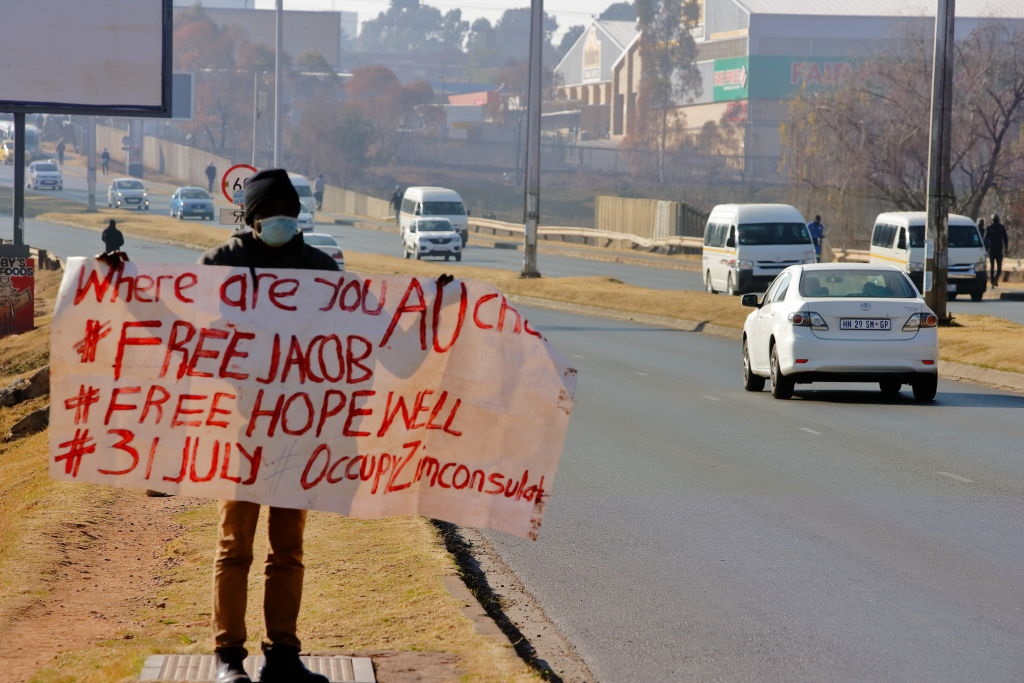
- While some journalists in Zimbabwe are worried about a growing repressive environment to practice their craft, some like Zenzele Ndebele are refusing to bow down to threats from the government.
- This as South Africans call on the ANC government, SADC and the AU to act.
- A request has also been sent to the National Assembly for MPs to debate happenings in Zimbabwe and possible solutions.
Journalists in Zimbabwe have vowed not to be silenced as President Emerson Mnangagwa decries "dark forces in and outside" of the country.
Zimbabwe has made headlines in recent weeks over claims of increasing violations against human rights and journalists being targeted for trying to report on rampant corruption and what some have deemed state-sponsored brutality.
Calls for reform have grown louder with the arrest of investigative journalist and activist Hopewell Chin'ono last month.
But as South African citizens and opposition parties attempt to put pressure on their own government, the South African Development Community and African Union, which it currently chairs, Zimbabwean journalists are grappling with functioning in increasingly difficult terrain where they say news reports, giving commentary on the state of the country and even tweets could cost them their lives.
Zenzele Ndebele, a freelance journalist, who has also covered stories for numerous South African and global media is one of those.
Ndebele, speaking to News24 just days after deciding to come out of hiding, said he was not willing to allow security forces to dim his voice.
"During the Gukurahundi, I was very young, saw my parents being brutalised, neighbours being attacked I couldn't do anything then because I was young. I cannot stand again and watch, seeing the same evil, when I have the capacity to act," he told News24, referring to the 1983 massacre perpetrated under the leadership of long-serving former president Robert Mugabe.
"He who holds the ladder for the thief is also a thief," he added.
Battles
Ndebele, like other Zimbabweans, links current battles to the 1980s, claiming it was not a coincidence that those who led in the violent insurgence were still in charge of the country now.
He listed Mnangagwa, Vice President Constantine Chiwenga and Agriculture Minister Perranance Shiri, who died last week, as part of the 50 Brigade and architects of the war waged against the Ndebele people under Mugabe's watch.
"Those currently in charge carried out the genocide and are not happy when we remind them of what they did, they are still using the same tactics even now."
He added when Mugabe, who died last year, was in charge he did not allow freedom of speech or the press and accused Mnangagwa of doing the same.
Ndebele questioned the current Zimbabwean president's commitment to fighting corruption, saying when he took over the reins following a coup he set up an anti-corruption commission.
"To us, this was a sign that he was willing to fight corruption, if that is the case then why persecute journalists who report on corruption?"
Some leaders in the government and ruling party Zanu-PF have dismissed cries for intervention, said one leader who spoke anonymously to News24.
The government insider added Zimbabweans were posting old material on Twitter, claiming all was well in a country once lauded as the "breadbasket of Africa" and now facing protracted economic strife.
"Some of the guys are openly mobilising people for violently toppling of government. That is beyond journalism. You can't practice politics and want to enjoy journalism rights at the same time," said the government leader.
The insider, who called Chin'ono a "ringleader", claimed those who reported on issues in the country were never harassed, insisting this was an attempt to create a movement to practice politics.
Similar sentiments about happenings in the country have been echoed by Mnangagwa who warned, during an address to the nation on Tuesday, he would "flush out" political opponents.
But Ndebele said his role was activism in and of itself.
"Journalists by their nature are information activists, for them saying there is corruption in Zim and it has to be addressed is calling for regime change … it cannot be classified as regime change."
He added the very nature of a democratic state meant regime change would happen and questioned whether the current government did not view the coup removing Mugabe or even the removal of Ian Smith by Zanu-PF as regime change.
Ndebele said the trend of human rights violations by the state continued throughout the Covid-19 lockdown, with reports of the police attacking women and killing citizens, none of which he said have been brought to justice.
Irritate
News24 also spoke to two other journalists, who described a continuing climate of fear, which has resulted in some in the media treading carefully so as to not "irritate government".
"It's bad. Lesser-known journalists are in even more trouble because they are not being talked about," one member of the media fraternity there complained.
They said even getting accreditation to either Zanu-PF or government events was difficult as there seemed to be a move to weed out most journalists, so the few who got to cover events could be closely monitored.
The third journalist who spoke to News24 agreed with views expressed by the government insider that, at times, members of the media involved themselves in politics, specifically claiming some were caught in the governing party's factional battles.
"Journos are afraid to ask real questions at government or even Zanu pressers, it's either you will be allowed into another one or they will come after you," said the media practitioner.
"Many times when the question and answer session comes, there is cold silence in the room. Social media have accused us of being dimwits or scared because we don't ask anymore," the journalist concluded.
Meanwhile in South Africa, One SA leader Mmusi Maimane, the EFF and African Transformation Movement (ATM) have been agitating for some sort of action.
ATM has written to Parliament requesting the matter be debated on an urgent basis.
"The silence of the House on this matter might have dire consequences for South Africa and further damning consequences for people of Zimbabwe who are exposed to this injustice by the Zimbabwean government," ATM president Vuyolwethu Zungula wrote in a letter to National Assembly Speaker Thandi Modise.
He said the country had to show an interest in cross-border issues that fuelled inequality and injustice.
Maimane also penned a letter, his was to International Relations Minister Naledi Pandor requesting a demarche on Zimbabwean Ambassador to South Africa David Hamadziripi, requesting full information on what is unfolding in his home country and a commitment to bringing the alleged human rights abuses to an end.
The EFF released a statement, which raised the ire of numerous political leaders in Zimbabwe, calling for the closure of Zimbabwe's embassy until human rights were restored in that country.
South Africans, much like their Zimbabwean counterparts, have taken to social media with the hashtag #ZimbabweanLivesMatter, which has seen prominent people from different sectors weighing in on the happenings in Zimbabwe.
